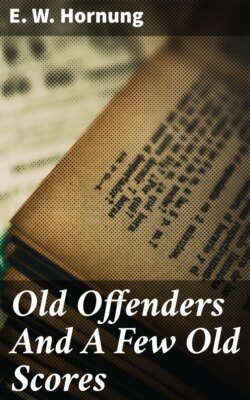Читать книгу Old Offenders And A Few Old Scores - E. W. Hornung - Страница 3
На сайте Литреса книга снята с продажи.
Preface
ОглавлениеTable of Contents
By the premature death of my brother-in-law, Mr. E. W. Hornung, British literature sustained a notable loss. He was but fifty-four when he passed over, and as his powers had steadily expanded with every year of his life, it is probable that they had not yet reached their full maturity. But even as it was, his output was considerable, for from the day that his “Bride from the Bush” attracted attention in the early ’nineties down to the period of the war he was always at work in his thorough conscientious way, and there was none of that work which could be called conventional, for he always brought to it a literary conscience, a fine artistic sense, and a remarkable power of vivid narrative. At his best there is no modern author who, by the sudden use of the right adjective and the right phrase, could make a scene spring more vividly to the eyes of the reader.
The Raffles stories are, of course, conspicuous examples of this, and one could not find any better example of clever plot and terse admirable narrative. But in a way they harmed Hornung, for they got between the public and his better work. Some of that work is ambitious, and fell little short of achieving the high mark at which it was aimed. “Peccavi,” for example, is a very outstanding novel, deep and serious, while “Fathers of Men” is one of the very best school tales in the language, taking the masters in as well as the boys, and thereby perhaps marring the book for the latter. But it was a remarkable achievement, and might well be so, for on the one hand the whole subject of public-school education, and on the other the national game of cricket, were two of Hornung’s chief hobbies. He was the best read man in cricket lore that I have ever met, and would I am sure have excelled in the game himself if he had not been hampered by short sight and a villainous asthma. To see him stand up behind the sticks with his big pebble glasses to a fast bowler was an object lesson in pluck if not in wicket-keeping.
His sympathies were intense, and his point of view clear, and when he focussed his powers upon anything which really appealed to him the effect was remarkable. He played the part of a man during the war, and after the death of his only son he went out to serve the troops in France as best he might. His little book, “Notes of a Camp-follower,” gives some of his impressions, and there are parts of it which are brilliant in their vivid portrayal. I am tempted to take a single passage lest the reader thinks I am too generous in diffuse commendation. It is the march of the Australians to mend the broken line at Amiens.
“They were marching in their own way—no strut or swing about it, but a more subtle jauntiness, a kind of mincing strut, perhaps not unconsciously sinister and unconventional, an aggressive part of themselves. But what men! What beetling chests, what muscle-swollen sleeves, what dark pugnacious clean-shaven faces! Here and there a pendulous moustache mourned the beard of some bushman of the old school, but no such adventitious aids could have improved upon the naked truculence of most of those mouths and chins. In their supercilious confidence they reminded me of the early Australian cricketers, taking the field to mow down the flower of English cricket in the days when those were our serious wars.” The part which the public schools played in the war was also a great joy to Hornung. “Only our public schools could have furnished off-hand an army of natural officers, trained to lead, old in responsibility, and afraid of nothing in the world but fear itself.”
It was a hard fate that when Hornung had come through it all, when he had seen peace dawn, and recovered from the first shock of his loss, with all his work lying in front of him and the prospect of quiet literary days before him, he should have met a sudden end while taking a short holiday in the South of France. It was aggravated influenza which carried him off, but he had always been delicate, and it was only his quiet courage which prevented his friends from constantly knowing it. He was loved by many, and as I dropped flowers upon his newly turned grave at St. Jean de Luz, where he lies with only a gravel path between him and George Gissing, I felt that the tribute was from many hearts besides my own.
Arthur Conan Doyle
